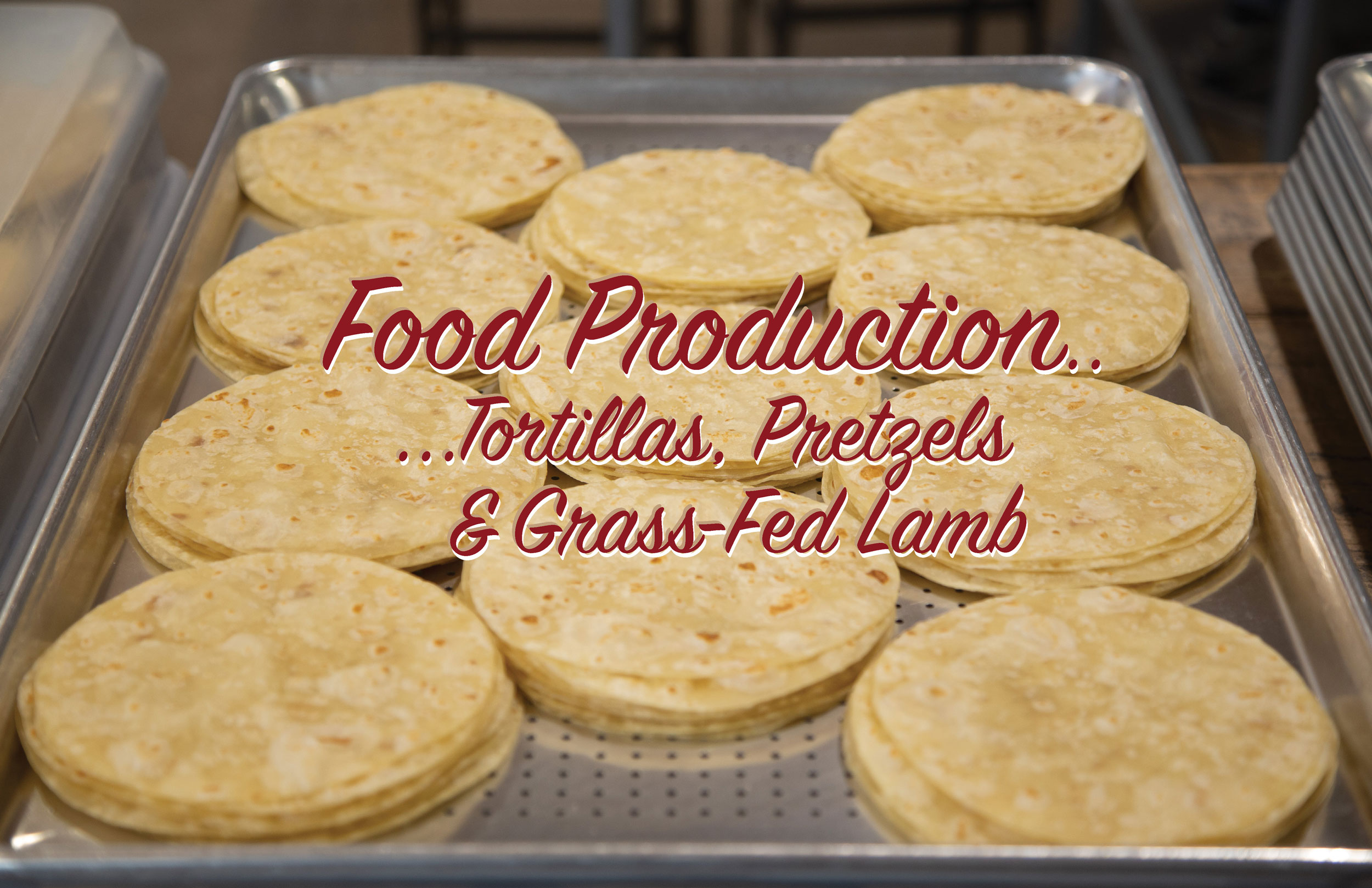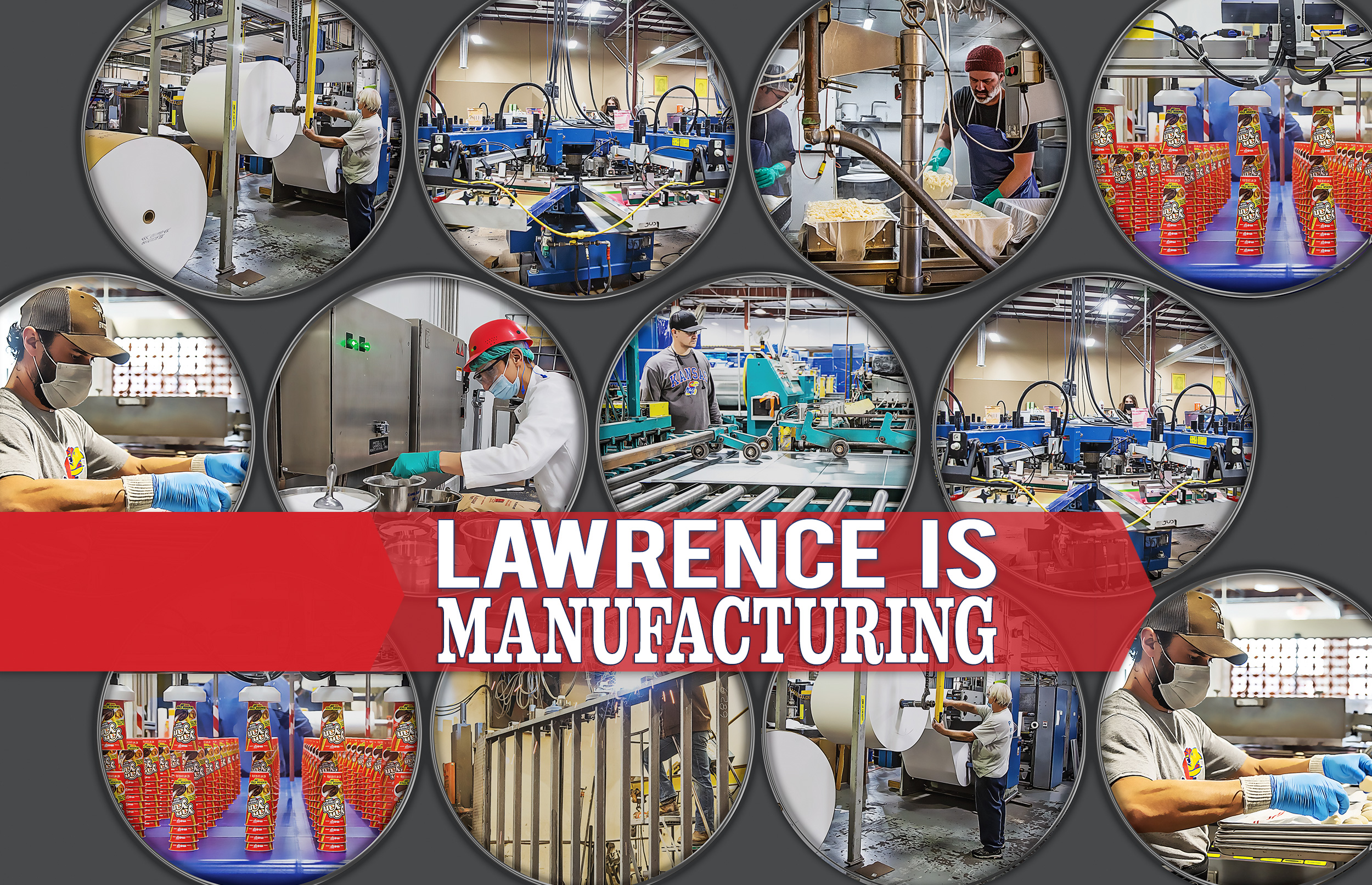| story by | |
| photos by | Steven Hertzog |
| OPEN A PDF OF THE ARTICLE |
Traditional and not-so-traditional fare is manufactured right here in Lawrence, providing jobs and revenue to the city.

Caramelo tortillas ready for packaging.
It’s highly likely that, at one time or another, you’ve eaten a piece of food and pondered about where it came from. Perhaps a juicy, flavorful orange ignited thoughts of sunny Florida. Dipping a chip into a bowl of delicious guacamole brought about visions of Mexican beaches. Or a perfectly grilled rib-eye steak conjured feelings of cattle grazing on a central prairie.

Reuben Leal keeps an eye on all production at Caramelo. Making and packaging tortillas.
But did you know there are food products created and made right here in Lawrence? Maybe not many, but especially if you’re a fan of tasty snack foods or fresh lamb meat, you’d do quite well to narrow the search to local.
Three such manufacturers create traditional and nontraditional foods in Lawrence. And all are relative newcomers to the city’s manufacturing and food scene.
Caramelo makes simple, authentic Sonoran tortillas from its expanding, one-room manufacturing facility in east Lawrence. Owner Ruben Leal began recreating his favorite flour tortillas from his Mexican homeland in 2018 but just moved into his new space off Ninth and Pennsylvania streets last April. In the meantime, he’s also gone from selling tortillas to local markets and food service providers, to selling internationally and having his business featured in several prominent national publications.
Pretzels Inc. added its third plant to its original two in Indiana to support another huge pretzel manufacturer nearby and, in so doing, became the first major tenant in Lawrence’s newly developed Venture Park.
And Central Grazing Co., with a warehouse in Lawrence and two parcels of grazing land in Douglas County, utilizes regenerative farming practices and sustainable, regional food systems to produce food that respects not only the animals but the land and people who work on it.
Not only are all three companies experiencing growth and success on their own, they provide the city benefits, both tangible and intangible.
“Of course, the ability to employ workers is one tangible plus for the city,” says Jana Tuttle, human resources manager at Pretzels Inc. The Lawrence plant employs 70, and plans are to increase to 300-plus over the next three to five years.
“We make a conscious effort to pay a comparable and fair wage for the Lawrence area,” Tuttle says. “They’re spending most of that money locally. We’re also providing opportunities for people to come in and learn a skill. We’re partnering with Peaslee Tech to get people skills and place them here or in other similar industries. We’ve partnered with the school district to show students there are a lot of opportunities in manufacturing.
“There are a lot of growth opportunities,” she adds.

Making and packaging tortillas.
Straight From Home
Leal’s Caramelo tortilla company basically came about as a product of homesickness.
Born and raised in Hermosillo, in the state of Sonora in Mexico, just south of the Mexico-Arizona border, Leal came to the U.S. to attend college at the University of Arizona in Tucson, where he met his then wife, a native Kansan, and followed her first to Austin, Texas, and then to Lawrence.
All the while, the delicious tortillas his mother made the family growing up were never far from his thoughts—or probably closer to the point, his cravings.
“It all started with missing tortillas from home,” he says. “I started experimenting in the kitchen. I found a random recipe online to use as a base and started tweaking it. I went to my mom’s funeral in Hermosillo and, while I was down there, I found her tortilla press.
“It just grew from there,” Leal explains. “At first, I thought, it’s a lot of work (starting a business). But I decided to give it a try.”
Leal named his company Caramelo, paying tribute to the name of the street tacos he ate growing up in Hermosillo.
Originally, he set up shop in 2018 in a tiny, 900-square-foot space at 19th and Massachusetts streets, where he started making one tortilla at a time and selling strictly locally to The Merc Co-op, at Ninth and Iowa streets.
Leal says demand for his product grew quickly. What started out as four to five employees in a cramped space has now grown to eight employees in a 3,200-square-foot building on Lawrence’s booming east side. Caramelo produces 35,000 tortillas per week and sells to restaurants all around the country, including six in Denver, all the other 49 states, Canada, Puerto Rico and the Virgin Islands. The company also ships directly for online orders. It has a strong social media presence, with 20,000-plus followers on Instagram.
Meanwhile, Leal says The Merc sells about 150 dozen Caramelo tortillas per week.
The secret to what makes Caramelo tortillas so tasty, he says, lies in the simplicity of the process. Leal makes just three types of tortillas: those made with pork fat, duck fat and avocado oil. Each tortilla adds just water, sea salt and wheat flour to one of those ingredients.
“I think keeping it simple is what makes it special,” he says. “We live in a world where things sit on shelves. These tortillas only keep for three weeks; but you can freeze them.
“It’s funny, but some buddies back home (in Mexico) asked me to send some down,” Leal laughs.
Caramelo tortillas has drawn attention from such prestigious publications as The Wall Street Journal, which featured the company in a 2019 profile, Bon Appétit, Food and Wine and People magazines.
Leal says he wants to add corn tortillas to the company’s repertoire and expand his existing work space later this year.
“A lot of people want to drive to Lawrence just to get tortillas,” Leal says with pride. “It’s a really unique product.”

Top to bottom: Jana Tuttle, HR Manager; Noah Pogany, Baker, is measuring ingredients for making the pretzel dough; Pretzels can be seen dropping at the turn around for additional baking; Dough is extruded onto the belt. The Lawrence
bakery makes twisted rod pretzels. The dough will be cut to make a bite size rod.
A “Twisted” Story
Lawrence has another nearby giant in the pretzel industry to thank for bringing it the first major tenant to Venture Park, the huge development on the eastern edge of the city. However, the roots of Pretzels Inc. go back much further, to 1978, when Bill Mann, whose father was the first pretzel maker to move west of Pennsylvania in the early 20th century, teamed up with friend Bill Huggins to provide pretzels for other companies’ products. They hit the road and headed farther west in search of a place to establish roots when their car broke down in Bluffton, Indiana. The mechanic who worked on their car said he knew of a facility that might suit their needs perfectly.
Pretzels Inc. was born. In addition to the Bluffton facility, a second facility in Canonsburg, Pennsylvania, was established but burned down in 2015. The company decided to add a second facility in Indiana, in Plymouth, in 2017.
All the while, Pretzels Inc. was supplying pretzels to Dot’s Homestyle Pretzels at its headquarters plant in North Dakota. Dot’s has one of its largest facilities in Gardner, just 30 miles southeast of Lawrence.
“That facility’s needs increased, so we looked for a facility closer to further support Dot’s needs,” human resources manager Tuttle says.
The company looked at 20 different sites in the Kansas City area, she explains, but settled on Lawrence and Venture Park because of strong support from the City and Chamber of Commerce.
“We broke ground in November 2020,” Tuttle says. “We had our first sellable products in August of 2021. It was a pretty quick turnaround.”
The 150,000-square-foot Pretzels Inc. facility, highly visible as you drive into town from the east on 23rd Street, contains two spindle ovens, which produce 70,000 pounds of braided pretzels every day. Those twisted treats are bulk-packed into 34-pound boxes and shipped the short distance to Dot’s in Gardner, where they’re seasoned and packaged for distribution.
Currently, the Lawrence facility creates and bakes just the braided pretzel. The Plymouth plant produces pretzels filled with everything from peanut butter to almond butter, and also houses the company’s innovation facility; the Bluffton plant makes what are called extruded snacks—corn puffs, cheese curls and the like.
“(The Lawrence facility) was made big enough to grow,” Tuttle says. “There’s potential for a lot of growth here.”
Pretzels Inc. won’t be able to find more hours in the day to bake pretzels, however. The plant runs 24/7.
Tuttle says thus far, the company has weathered installing a new facility in the heart of a worldwide pandemic just fine.
“Our progress has been positive and steady,” she says. “We’re all still wearing masks and taking extra safety precautions. This is such a new process for the area … I think it piques the interest of a lot of people. Finding people who work in food is always challenging, but it’s nice we get to train people from the ground floor.”

Jacqueline Smith, Central Grazing Company & Jacqueline and her two children Elliot and Liam, photos by Leia Marasovich
Regenerative Agriculture
As a youngster growing up in southwest Missouri, Jacqueline Smith witnessed firsthand the disappearance of small, family-run businesses, particularly farms, because of the encroachment, consolidation and expansion of large, industrial agricultural operations. It affected her deeply.
“My family was in construction and, growing up, I saw that industries that were there to support families like mine were disappearing,” Smith says. “Consolidation of the agriculture industry dried up opportunities for small farmers. This caused a major crisis in the farming community. I knew agriculture was important to push opportunities in multiple reaches throughout our communities.”
Instead of retreating from the challenges facing farmers across the U.S., Smith jumped into the fray. “I got involved with agriculture at a young age,” she says.
At the turn of the century, Smith cofounded a small regenerative sheep dairy north of Kansas City. With that business, she focused on taking soils from land used to raise crops and turning it back into natural pastureland.
Smith says she “built a business structure that helps others in the industry,” and over the next 15 years, the sheep dairy and creamery went from being the lone sheep dairy in the area to being among 12. Smith embarked on a similar business with Central Grazing Co. in 2015. Instead of producing sheep milk, she started buying sheep from many of the sheep dairies in the area and raises around 400 on her two locations in north Douglas County, producing and delivering a humanely raised grass-fed lamb to customers across the country through online orders, which can be taken at www.centralgrazingco.com.
However, the business goes beyond that. Not only does Smith care greatly about the current food and supply chain systems, she also cares about animal welfare.
“I’m a strong believer that you cannot have good animal welfare without taking care of the soil,” says Smith, Central Grazing’s CEO.
She says most sheep eventually are sold at auction and end up in feedlots. However, the sheep she purchases are placed in pastures and allowed to graze and live humanely, free of hormones and other drug additives. Flocks are rotated to different grazing paddocks every 24 hours and don’t return to that paddock for at least 90 days, allowing for long root systems to develop in growing grass and leaf growth. That, Smith says, makes the land more resilient when water is scarce.
Central Grazing uses contractors for meat processing, she adds, a business practice that was challenging in good times but made even more challenging during the COVID-19 pandemic. She currently contracts with processors in Iowa, Kansas and Missouri.
“Processing is a scarcity since COVID,” she says. “There’s not enough processing …We’re doing the best we can. It gets very complicated logistically.”
Central Grazing Co. has a warehouse in Lawrence that handles all the company’s customer fulfillment. In addition to lamb meat, the company also sells wool and leather goods. It has three full-time employees and eight contracted employees, but she hopes to grow to a staff of at least 42 during the next few years with the help of government grants and private investments. Smith plans to eventually secure her company—and other like businesses in the region—with its own processing facility in the not-so-distant future.
“I want to create a pathway for new and beginning partners to have access to land,” she says. “I want to build land infrastructure, keep land in agriculture production through niche markets. I want to help stabilize the small-farming industry, all while improving the diversity of the natural landscape.”





